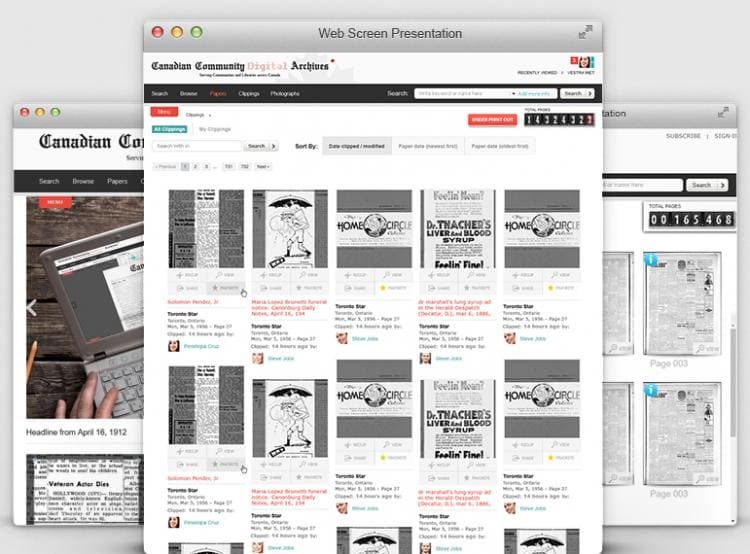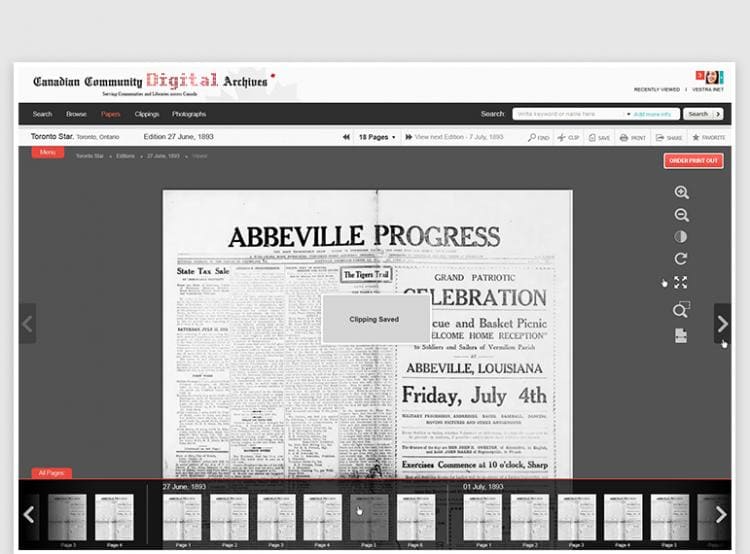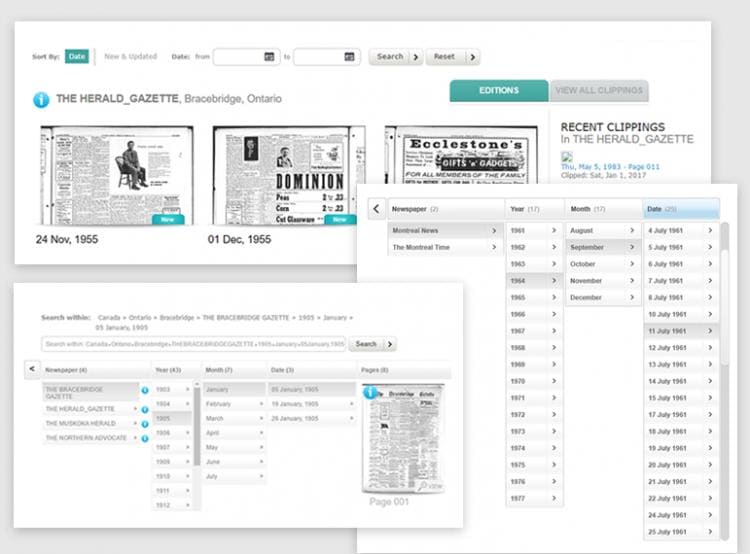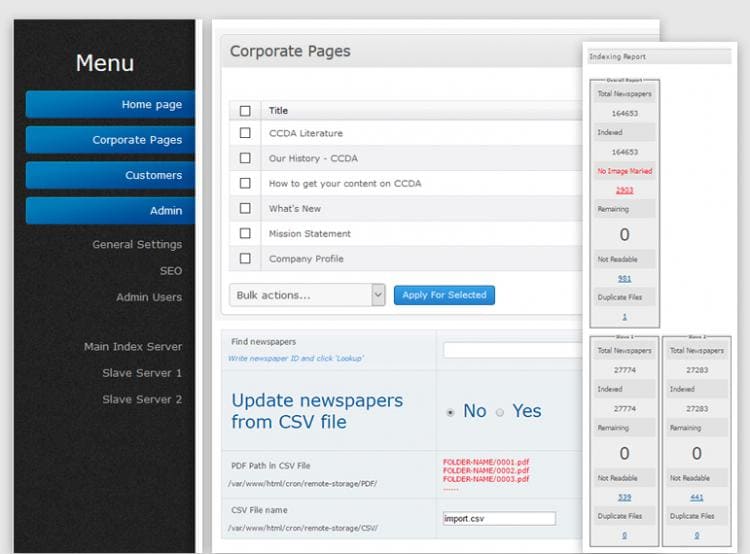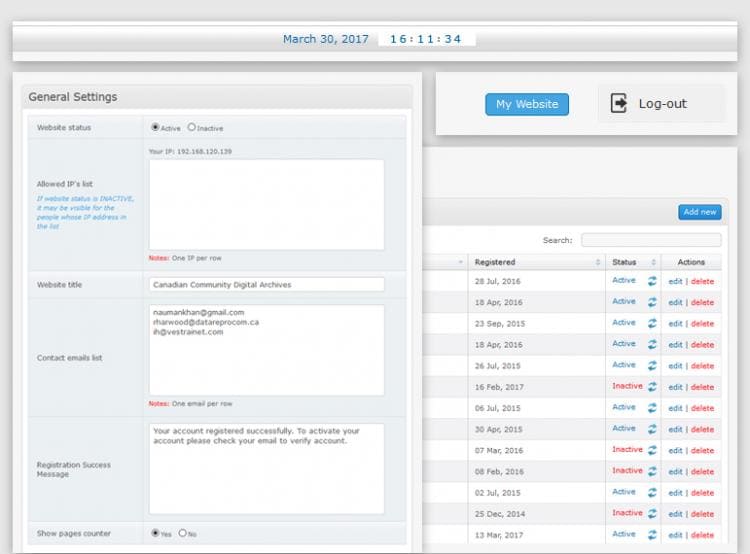Vestra Inet's Impact: Canadian Community Digital Archives – Transforming with Digitized, Searchable Documents

The Canadian Community Digital Archives is a new online movement that aims to consolidate libraries and communities across Canada to provide easy access to a huge range of old newspapers, documents, and photographs, many of which date back decades.
- Digitization of vast library of documents and newspapers
- Comprehensive online library system
- Conversion of scanned images to PDF format
- Making all PDFs searchable for faster access
- Personal folders to save clipped documents
- Framed print order system
The Archives needed a complete system of searchable digital documents and newspapers. They needed a system that would scan old documents, digitize them, and make them searchable. Users also had to be able to save sections of interest and create their own mini-library of information. The system would have to include social networking, custom profiles, and a database that spanned all of Canada.
Type of Systems Used in Project
PDF Generator
- Automatic PDF generator
- Picture-to-PDF conversion & Searchable PDF
- Generate PDF for product configurator
Modern websites have dynamic pages where the information that is displayed is generated from databases based on input from different systems such as product builders, ordering systems, e-commerce platforms, and more. However, there are situations where this data must be saved or printed. Examples of these situations include invoices, order information, shipping details, inventory data, performance statistics etc. The most common format to save the data in is PDF.
Automatic PDF generators were designed to store this unique information for later reference and put it into a more accessible format for emailing, printouts or backups. In unique situations, scanned images were converted to searchable text in PDF format to facilitate navigation through archives with large quantities of scanned information and documents.
Search Filters
- Custom search filter management
- Automatic filter generation
- Faster data navigation
Clients with large catalogues and inventory sizes required search filters to improve accessibility and the speed with which product information was retrieved. Custom search filters were built and integrated into various client systems. Multiple attributes were used to organize products and resources. In certain situations, automatically updating filters were implemented where required. Additionally, clients with administrative access could add and modify custom parameters for filters.
In situations where complex inventory structures resulted in regular search being insufficient to find items, the implementation of these search filters significantly improved the user experience. Users could select parameters to narrow down search results for faster, more accurate searches. Custom filter management allowed user-defined parameters to be set to meet unique inventory hierarchies. The integration of these search filters saved time, eliminated irrelevant results, and improved satisfaction across the board.
Database Conversions
- NoSQL, Pervasive, and CSV conversions
- Custom SQL query support
There are various outdated databases and file storage systems that exist today. These systems are incapable of integration with modern technology. However, loss of the data stored on these systems or being forced to re-upload is unacceptable for clients with large quantities of data. Therefore, these systems such as non-relational databases, Pervasive PSQL engines, CSV files and more were successfully converted to MySQL (UNIX-based) or MS-SQL (Microsoft-based) systems based on requirements.
As a result of this conversion, all data within these systems became compatible with modern technology such as Structured Query Language (SQL) queries. This data could then be utilized to meet special needs. The benefits of these upgraded SQL-supported databases included complex query support, fully indexed and searchable data, elimination of data processing errors, and no data duplication, among others.
Database Synchronization
- Multiple languages programmed
- Real-time database updates
- Synchronization with external databases
Often, important information is located in multiple systems or spread over multiple locations. It is essential to communicate specific data among these locations as required. Identifying relevant data, transferring it to a centralized database, and synchronizing the data among various sources is a major issue.
Specialized bridges were programmed for clients with multiple databases, locations, and sources of information to facilitate the synchronization of data between these. These bridges were built to translate data between various types of databases including relational and non-relational or sequential and non-sequential. Additionally, transference of data between sources written in various languages such as MySQL, MS-SQL, Oracle, etc. was established.
Online Catalogue
- Multi-system integration
- Complex item relationships
- Automatic SKU generation
Having large inventories consisting of thousands of items with different variants and combinations leads to organizational issues. One of the obstacles faced by clients is the presentation of these listings to customers. Appropriate relationships between items of different compatibility settings are critical to a smooth user experience when navigating the product listings. Additionally, identification of unique items and combinations is essential where products are modified with infinite combinations of components. Effective search functionality within such an inventory is crucial to ensure user satisfaction.
Based on individual requirements, online catalogues were implemented for various clients. These systems were implemented alongside multiple systems and databases. Integration was supported with existing systems such as inventory control, production management, e-commerce platforms, and more. Various complex relationships were defined between items and their components to ensure compatibility. Additionally, online product builders were designed and implemented as required. In these cases, every uniquely designed item variant could be automatically added to the existing catalogue with a unique automatically assigned SKU number, creating self-propagating catalogues. Other features such as table builders (one product - multiple SKUs) and compatibility filters were also designed.
User Accounts and Logins
- Dedicated login spaces
- Allow and prevent access
- Brings multiple systems together
User accounts grant controllable access to specific features within a system. Dedicated login spaces for various user types included multiple specialized features to meet specific requirements. Access control features permitted accounts with administrative access to limit users to specific information and resources within these spaces. Additionally, unique data such as resources, items, products, offers, and dedicated pricing information could be displayed within accounts.

